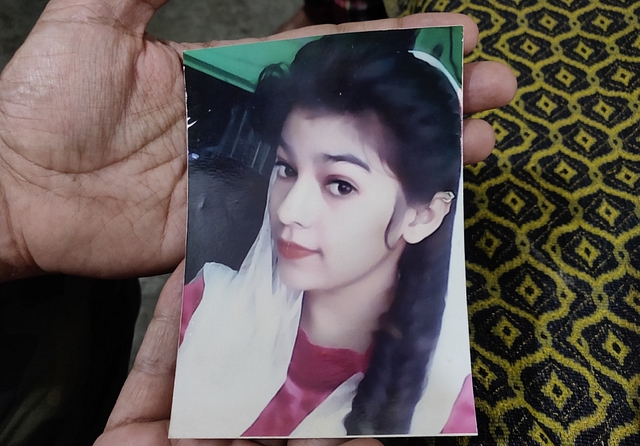
Sher Khan Killed Naina Kaur For Turning Him Down. So Which Family Left The House In Fear?
There is little state or social support to victims.
In June, 21-year-old Naina Kaur was stabbed to death near her house by a stalker named Sher Khan in the national capital region.
Naina was the only child of her parents Baldev Singh, 60, and Neelam Kaur, who is a few years younger than Singh.
The murder left the aged couple not only emotionally broken but also face-to-face with a financial crisis. Singh’s job had been terminated during the lockdown as he hit the retirement age. Naina, who was pursuing a diploma in nursing, was working part-time in a hospital to support the family.
The only saving grace was that the family did not have to pay a monthly rent. Singh owns a one-room set in Tulsi Niketan area located on the border of Uttar Pradesh and New Delhi. He got the house under a jhuggi-jhopdi rehabilitation scheme of the government.
After Swarajya highlighted the family’s plight in September, Singh received monetary help from the public through a social organisation.
However, there was another problem that was troubling them day in and day out. It was fear.
Neelam Kaur is the only eyewitness to the murder, which took place on 17 June around 8.30 pm when all shops in the colony had been closed for the day. The case hangs on her testimony.
Singh told this correspondent in an earlier visit that Neelam Kaur constantly feared for her life. She was scared that Khan’s family might harm her in order to weaken the police case.
There was little emotional support from neighbours and relatives, who began to distance themselves from the family due to the police case.
Baldev Singh says Neelam’s health has deteriorated badly due to the trauma of the murder as well as the ensuing fear.
Earlier this month, the aged couple finally locked their house in Tulsi Niketan and quietly shifted to a rented accommodation to another area within Delhi. It’s an additional expense for them, but one they have no option but to bear.
“I should not say this, but your aunty would not have survived for long there,” Singh told this correspondent.
“The decision was tough for me. Last month, my wife and I went to Harmandar Sahib (Golden temple in Amritsar). There, we prayed for strength,” says Singh. “I also wore the turban, which I had given up some 40 years ago.”
Singh says the police have not approached them even once since the murder. “After Sher Khan was arrested, I called up the concerned police station. The officer said we would be soon called for identification. But they never did,” he says.
“When we called them some weeks later, the officer said the case was out of his hands and being handled by seniors. I have not heard from anyone even once.”
The case was registered at Tila Mor Police Station (FIR number 212/2020) that falls under Ghaziabad district of Uttar Pradesh. After Khan’s arrest, the police filed another FIR after recovery of the weapon (FIR number 220/2020) under the illegal arms’ act.
In sharp contrast to Naina’s family, Khan’s family is large, comprising several men, and is financially much better.
Khan’s family lives in Sunder Nagri, where they own a house and a garment showroom. The area is about a kilometre away from Naina’s house.
Sher Khan has seven siblings including four brothers.
The showroom was closed for a week after the murder, but resumed business. On 4 March, when this correspondent visited Naina’s parents, Khan’s showroom was open and his mother Kehkasha was seen at the cash counter as usual.
The tragedy of Naina‘s parents after her murder reveals a lot about the functioning of the criminal justice system and prevailing social view of crimes. There is little state and social support to victims.
The situation is worse if the perpetrators belong to the Muslim community, which few political parties and organisations are willing to antagonise and which, in the eyes of the secular media and politics, is always the biggest victim and perpetually living in fear.
Singh says that after the murder, several local organisations — including Sikh groups — and political workers visited him. None of them however extended any help despite promises. Singh says he suspects that it had to do with the perpetrator’s identity. He has also got no compensation from the state government.
As he speaks, he shows his diary where he has neatly noted down the phone numbers of all those who visited him.